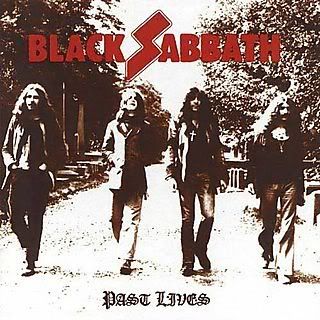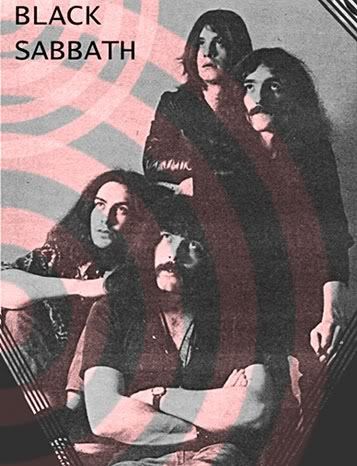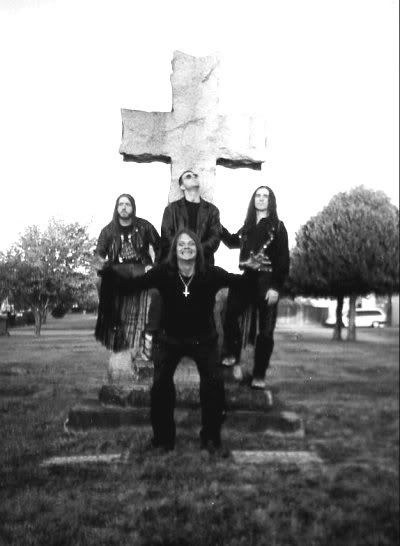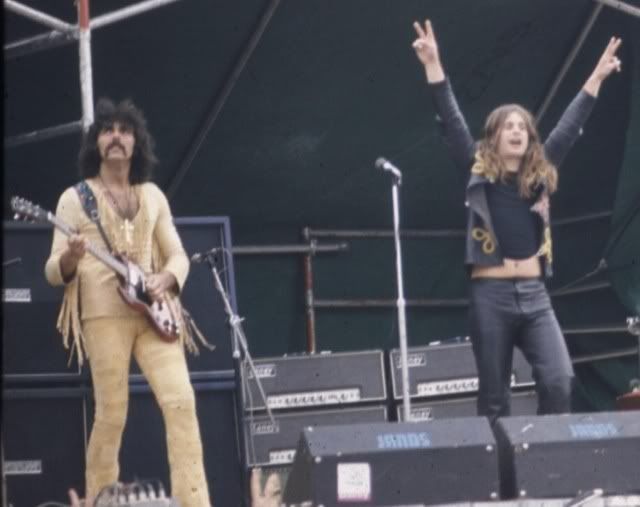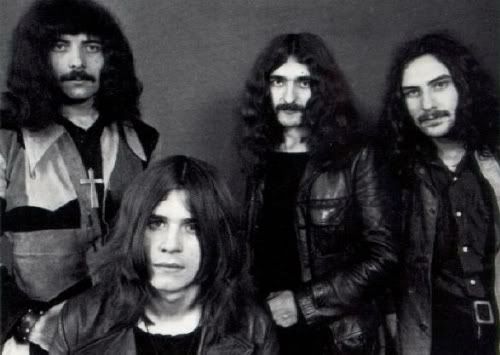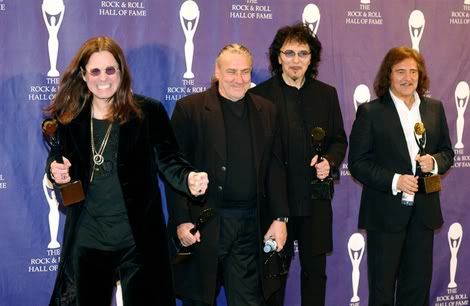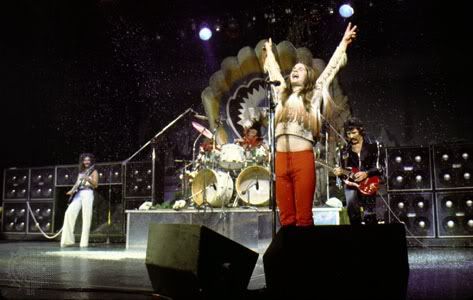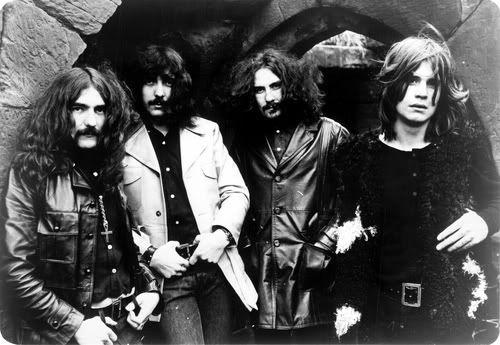Post by cofi on Aug 14, 2007 13:36:40 GMT
Black Sabbath
From Wikipedia,
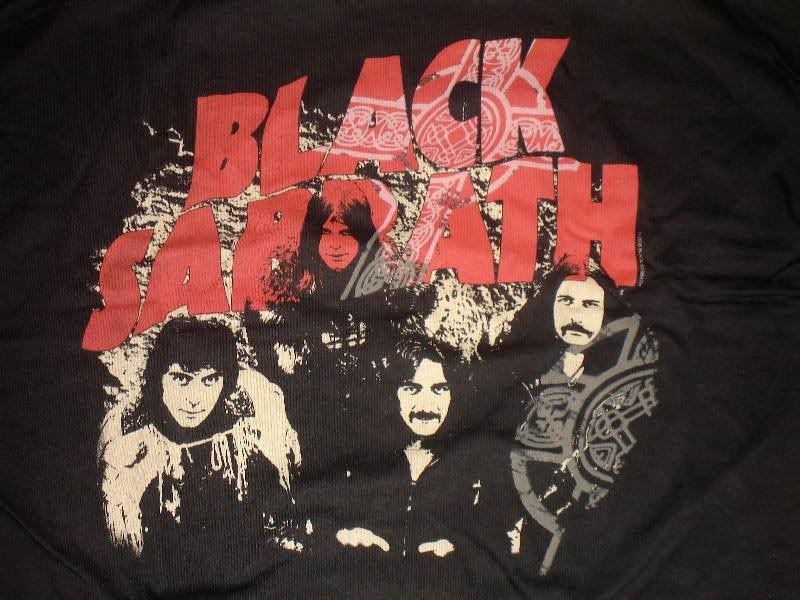
Black Sabbath are an English heavy metal band from Birmingham. The original band line up of Ozzy Osbourne (vocals), Tony Iommi (guitar), Terence "Geezer" Butler (bass), and Bill Ward (drums) is the same as the current line up (2007) although there have been many shifts of personnel over the years.
Black Sabbath remain a dominant influence in the heavy metal genre they helped create. VH1's 100 Greatest Artists of Hard Rock ranks them second, behind Led Zeppelin.[4]
Currently, the early 1980s line-up of the band featuring Iommi, Butler, Ronnie James Dio and Vinny Appice are touring under the moniker Heaven and Hell, a title taken from the 1980 Black Sabbath album of the same name.
[edit] Formation and early days (1968)
Black Sabbath formed in Aston, Birmingham, England in 1968 under the name Polka Tulk Blues Company (soon shortened to "Polka Tulk"), and later were called Earth, playing blues rock and hard rock.
Guitarist Tony Iommi was greatly influenced both by Hank Marvin's heavy guitar performances in the band Cliff Richard and the Shadows, and by jazz guitar, particularly that of Django Reinhardt.Iommi left Earth for a short time to tour with Jethro Tull. Ward has also expressed a fondness for jazz music, especially drummers like Buddy Rich and Gene Krupa. Geezer Butler cites bassist/vocalist Jack Bruce of British blues band Cream as a major influence on him: “He was the first player I ever saw who bent the strings and played the bass as a totally independent instrument”. Early versions of Black Sabbath merged elements of blues, jazz, and rock and paid their dues playing cover versions of songs by heavy rock acts including Jimi Hendrix, Blue Cheer, and Cream. Osbourne says he was deeply influenced by The Beatles and his favourite album of all time is Revolver.
Earth moved in a darker direction when their bassist, Geezer Butler, a fan of the black magic novels of Dennis Wheatley, wrote an occult-themed song titled "Black Sabbath" The band claimed however, during a concert film, that the song name has more sinister origins. They have claimed that the name was created when one night Butler allegedly saw a black figure at the end of his bed. The next day it became apparent to Butler that an occult book Osbourne had given him was missing. In early 1969, when the band found themselves being confused with another local band called Earth, they adopted the song title as their new band name.
The group found its signature sound almost by accident. When the group was rehearsing in a studio, which was situated opposite a cinema showing a horror movie, Osbourne recalls that Tony Iommi(Reference video: Don't Blame Me) remarked to the rest of the band how it was strange that people willingly paid to see a movie intended to scare them. The band began to purposely write dark, ominous songs in an attempt to be music's answer to horror films, and in rebellion against the prevalent happy pop music of the 1960s. In a VH1 documentary about the band, Ozzy Osbourne recalled the laughable lyrics of radio-friendly pop at the time, such as "if you ever go to San Francisco, be sure to wear a flower in your hair...," (see: Scott McKenzie) - "screw that,", they said, "let's go over there and possess people."
First era - 'original' line up (1968-1979)
Pairing their new heavy sound and the stage antics of Ozzy Osbourne, the band found success beginning with their first album, the eponymous Black Sabbath, released on Friday the 13th, February, 1970. They signed to Warner Bros. Records in the U.S. and Canada, and Vertigo Records for the rest of the world. Their follow-up album Paranoid, also released in 1970, brought them even greater attention in America and the UK. The song "War Pigs" was written in protest against the Vietnam war and was originally planned as the title track. The band recorded "Paranoid" at the last minute simply to add length to the album. The song ended up becoming the title track for the album and the band's first single to garner substantial radio airplay.
Another innovation was the by-product of an accident. Tony Iommi lost the tips of two fingers on his fretting hand while working in a sheet metal factory. Initially, he forged himself prosthetics from a melted plastic detergent bottle. The injured fingers were understandably tender, so Iommi downtuned his Gibson guitar from standard E to C# (starting with the third album, Master of Reality). The reduced tension of the strings allowed him to play with less pain to his fingertips. Butler lowered his bass tuning to match Iommi's. The lower pitch gave the music a "heavier" or more substantive tone matching the band's lyrics.
Black Sabbath released another album in 1971, Master of Reality. This was the first Sabbath album to feature a significant amount of acoustic material ("Solitude" contained a flute solo by Iommi). This is an often overlooked switch in style by Black Sabbath, as they are largely known only for their simple, heavy, dark riffs. They added more varying musical elements by the time the band released Black Sabbath, Vol. 4 in 1972. Featuring the ballad "Changes" (containing only vocal, bass, piano and mellotron) and hard rock anthems like "Supernaut" and "Snowblind" (which included strings), Black Sabbath, Vol. 4 was the group's most mature record to date.
Tony Iommi and Ozzy Osbourne in 1973By 1973, the group was one of the most popular heavy metal bands in the world, and were a major concert attraction[citation needed]. Their next release, Sabbath Bloody Sabbath, saw the band working with Yes keyboardist Rick Wakeman on a session basis. Along with the title track, the album also included the space-rock styled "Spiral Architect," and the prog-rock inspired "A National Acrobat".
By this time the band was heavily addicted to drugs and Osbourne and Ward supposedly took LSD every day for two years.
Towards the end of Osbourne's tenure in 1978, he was so embroiled in drugs that he claims he was "very unhappy and got drunk and stoned every day". Many of the band's songs address drugs, both explicitly and implicitly.
The band was suffering major management problems (the group was managed by Osbourne's future father-in-law, Don Arden). The management problems and then a label change in the UK from Vertigo to WWA disrupted the release schedule of the band's new album while the band was still with Warner Bros. in the US and Canada. Despite the troubles, Sabotage was released in 1975 with continued success. However, drug problems, continued experimentation in their music style (Gregorian chants and a chorale of monks highlighted "Supertzar"), the hard rock scene's changing environment, and some internal issues were affecting the stability and output of the band.
Technical Ecstasy (1976) turned out to be a commercial failure. The album was laden with symphony orchestras, synthesisers, and vocals from drummer Bill Ward following a brief departure by Osbourne during the recording sessions. After the 1977 tour, Ozzy Osbourne stopped turning up at band rehearsals and the remaining band members recorded some music with singer Dave Walker, formerly of Savoy Brown.
Walker took part in the recording sessions for the bands upcoming longplayer by contributing lyrics to several songs. This version of the band even performed an alternate version of the track "Junior's Eyes" on the BBC Midlands 'Look Here!' programme in January of 1978. However, this would prove to be a short-lived incarnation of the band as Ozzy returned to the fold before vocals by Walker were laid down. The new album entitled, "Never Say Die!", was re-worked lyrically and eventually released in late September of 1978. By far the band's most experimental release to date, the album contained elements of many genres such as jazz, synth-pop and blues but like the previous album, its sales were poor.
Due to internal conflicts and an evident lack of commitment due to drugs, Ozzy Osbourne was asked to officially leave the band in 1979. Ozzy Osbourne stated in a later interview (found as a bonus disk in the album The Ozzman Cometh) that eventually he was glad to leave the band because of the band's daily drug and alcohol problems. Ozzy Osbourne later married Sharon Arden, daughter of Black Sabbath manager, Don Arden.
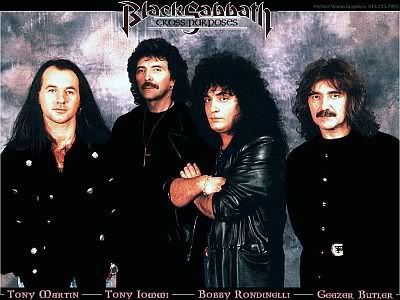
Second era - 'The Dio Years' (1979-1982)
Osbourne was replaced by former Rainbow vocalist Ronnie James Dio. Black Sabbath's next album (and first with singer Ronnie James Dio), Heaven and Hell, proved to be a revitalising success for the band with the band's highest charting since 1975's Sabotage. It was on this tour that Dio popularised the mano cornuta hand gesture, which has since become a symbol of heavy metal music in general. The album also marked the inclusion of Quartz's guitarist-turned-keyboardist Geoff Nicholls as a session musician (Nicholls has not been consistently credited as an official member, and has often been forced to play live shows from backstage for supposed aesthetic purposes, but he has co-written many songs and has stayed with Black Sabbath through all subsequent incarnations until 2001 when he was no longer retained). Also during the tour, drummer Bill Ward quit the band for personal reasons (both his parents died within a rather short period, and Ward was struggling with alcoholism and other addictions).
Drummer Vinny Appice joined to complete the tour and then record the next album Mob Rules, the title track appeared in the movie Heavy Metal. However, the recording featured in the film and subsequent soundtrack album is an alternate version from that which appears on the Mob Rules album.
The release in 1980 of the live bootleg Live at Last (recorded in the Ozzy Osbourne era during the 1973 Sabbath, Bloody Sabbath tour) prompted the band to properly record a live album on the Mob Rules tour, titled Live Evil. However, during the mixing of Live Evil, internal band problems and nasty accusations developed, which led to Dio and Appice quitting the band to form Dio.
Third era: Born Again - Ian Gillan Period (1983-1984)
Bill Ward returned to the drum throne and Ian Gillan of Deep Purple fame became the new singer. To quote the singer ; "I had no plans to join Black Sabbath. I went out with Geezer and Tony and we got drunk, and I found out the next day that I agreed to join the band. And they're such nice guys. It was great fun and it paid the bills, I had a lovely year with them and that was it."
This line-up recorded the album Born Again, but Bill Ward again dropped out of the band before the tour, being replaced by Bev Bevan of Electric Light Orchestra. On tour, Sabbath played the Deep Purple staple Smoke On The Water as the first encore. Although the album surprisingly ended up being one of their most successful ones to date (hitting #4 in the UK charts), things did not last, as Ian Gillan left to reunite with Deep Purple. Drummer Bill Ward once again returned to the fold, and the hiring of new singer David Donato was officially announced in 1984. However, after six months worth of rehearsals, American Donato was discharged by management when Iommi and Butler squabbled over financial issues.
Original line up reunion (1997-present)
In 1996, Ozzy Osbourne launched his successful Ozzfest metal festival tour, which he headlined on a nightly basis. On the 1997 tour, for the last part of his set each night, he was joined by Geezer Butler and Tony Iommi for a rundown on several Sabbath classics (Faith No More drummer Mike Bordin was on drums). However, in December 1997, original drummer Bill Ward joined forces with Osbourne, Iommi, and Butler to officially reform the original Black Sabbath on a permanent basis for the first time since 1979.
The reunion prompted the release of Black Sabbath's album Reunion a live double album of their shows at the end of 1997. The album also included the songs "Selling My Soul" and "Psycho Man". These were Black Sabbath's first new studio recordings since 1995, and their first with Ozzy since he left the band in 1979.
Since then, the band has released various compilations, including and an epic eight CD box set called The Black Box (includes all albums by the classic original lineup). In 1998, Vinny Appice replaced Bill Ward after Ward suffered a heart attack shortly before the band's European tour. By the time Sabbath toured the United States as part of the 1999 Ozzfest tour, Ward was back in the band for good. This lineup has remained stable ever since touring sporadically.
The band had writing sessions together in 2001, with legendary producer Rick Rubin. The band ultimately decided that all work done in that time was not good enough for the "legacy" of Black Sabbath - a decision which Ozzy has stated more firmly than the other band. They did play one new song ("Scary Dreams") throughout the 2001 Ozzfest tour despite this decision. Ozzy's solo contract delayed, further progress on the album (Sabbath had planned an attempt at an album in late 2001 but Ozzy worked on his album then and toured in early 2002). Sabbath remained inactive in 2002, because Ozzy had to work on his The Osbournes TV show and headline Ozzfest 2002. His career, as has been the case since the reunion, ran in parallel with Black Sabbath's own.
After no activity at all in most of 2002 and all of 2003, the band returned in 2004. The session keyboardist was Rick Wakeman's son Adam. He had been working with Ozzy, and, disappointly to longtime fans, replaced Geoff Nicholls. Nicholls had been working with the band since 1980's Heaven and Hell album. Black Sabbath headlined Ozzfest 2004 - and again at Ozzfest 2005. In November 2005, Black Sabbath were inducted into the UK Music Hall of Fame, and the band played at the awards ceremony. That same month it was also announced that they would be inducted into the US Rock and Roll Hall of Fame on March 13, 2006. This time Sabbath did not play any songs, instead having Metallica play two Black Sabbath songs, "Hole in the Sky" and "Iron Man".
Future of the band
Bill Ward decided not to participate in the Heaven and Hell, but that he would participate in a tour and new album of the original Black Sabbath lineup in late 2007. This has not happened because Heaven and Hell decided to make the tour last a whole year, but confirms the idea that a future with Ozzy is being planned.
In 2007, Ozzy Osbourne stated on his website that the original lineup of Black Sabbath would join forces in the studio record a new album, the first in over 30 years. Whether this will occur has yet to be confirmed by Tony Iommi or Geezer Butler who have remained vague, though they and Bill Ward have confirmed plans of some sort by Black Sabbath in 2008.
Another great band, that i still go and see when i can

From Wikipedia,

Black Sabbath are an English heavy metal band from Birmingham. The original band line up of Ozzy Osbourne (vocals), Tony Iommi (guitar), Terence "Geezer" Butler (bass), and Bill Ward (drums) is the same as the current line up (2007) although there have been many shifts of personnel over the years.
Black Sabbath remain a dominant influence in the heavy metal genre they helped create. VH1's 100 Greatest Artists of Hard Rock ranks them second, behind Led Zeppelin.[4]
Currently, the early 1980s line-up of the band featuring Iommi, Butler, Ronnie James Dio and Vinny Appice are touring under the moniker Heaven and Hell, a title taken from the 1980 Black Sabbath album of the same name.
[edit] Formation and early days (1968)
Black Sabbath formed in Aston, Birmingham, England in 1968 under the name Polka Tulk Blues Company (soon shortened to "Polka Tulk"), and later were called Earth, playing blues rock and hard rock.
Guitarist Tony Iommi was greatly influenced both by Hank Marvin's heavy guitar performances in the band Cliff Richard and the Shadows, and by jazz guitar, particularly that of Django Reinhardt.Iommi left Earth for a short time to tour with Jethro Tull. Ward has also expressed a fondness for jazz music, especially drummers like Buddy Rich and Gene Krupa. Geezer Butler cites bassist/vocalist Jack Bruce of British blues band Cream as a major influence on him: “He was the first player I ever saw who bent the strings and played the bass as a totally independent instrument”. Early versions of Black Sabbath merged elements of blues, jazz, and rock and paid their dues playing cover versions of songs by heavy rock acts including Jimi Hendrix, Blue Cheer, and Cream. Osbourne says he was deeply influenced by The Beatles and his favourite album of all time is Revolver.
Earth moved in a darker direction when their bassist, Geezer Butler, a fan of the black magic novels of Dennis Wheatley, wrote an occult-themed song titled "Black Sabbath" The band claimed however, during a concert film, that the song name has more sinister origins. They have claimed that the name was created when one night Butler allegedly saw a black figure at the end of his bed. The next day it became apparent to Butler that an occult book Osbourne had given him was missing. In early 1969, when the band found themselves being confused with another local band called Earth, they adopted the song title as their new band name.
The group found its signature sound almost by accident. When the group was rehearsing in a studio, which was situated opposite a cinema showing a horror movie, Osbourne recalls that Tony Iommi(Reference video: Don't Blame Me) remarked to the rest of the band how it was strange that people willingly paid to see a movie intended to scare them. The band began to purposely write dark, ominous songs in an attempt to be music's answer to horror films, and in rebellion against the prevalent happy pop music of the 1960s. In a VH1 documentary about the band, Ozzy Osbourne recalled the laughable lyrics of radio-friendly pop at the time, such as "if you ever go to San Francisco, be sure to wear a flower in your hair...," (see: Scott McKenzie) - "screw that,", they said, "let's go over there and possess people."
First era - 'original' line up (1968-1979)
Pairing their new heavy sound and the stage antics of Ozzy Osbourne, the band found success beginning with their first album, the eponymous Black Sabbath, released on Friday the 13th, February, 1970. They signed to Warner Bros. Records in the U.S. and Canada, and Vertigo Records for the rest of the world. Their follow-up album Paranoid, also released in 1970, brought them even greater attention in America and the UK. The song "War Pigs" was written in protest against the Vietnam war and was originally planned as the title track. The band recorded "Paranoid" at the last minute simply to add length to the album. The song ended up becoming the title track for the album and the band's first single to garner substantial radio airplay.
Another innovation was the by-product of an accident. Tony Iommi lost the tips of two fingers on his fretting hand while working in a sheet metal factory. Initially, he forged himself prosthetics from a melted plastic detergent bottle. The injured fingers were understandably tender, so Iommi downtuned his Gibson guitar from standard E to C# (starting with the third album, Master of Reality). The reduced tension of the strings allowed him to play with less pain to his fingertips. Butler lowered his bass tuning to match Iommi's. The lower pitch gave the music a "heavier" or more substantive tone matching the band's lyrics.
Black Sabbath released another album in 1971, Master of Reality. This was the first Sabbath album to feature a significant amount of acoustic material ("Solitude" contained a flute solo by Iommi). This is an often overlooked switch in style by Black Sabbath, as they are largely known only for their simple, heavy, dark riffs. They added more varying musical elements by the time the band released Black Sabbath, Vol. 4 in 1972. Featuring the ballad "Changes" (containing only vocal, bass, piano and mellotron) and hard rock anthems like "Supernaut" and "Snowblind" (which included strings), Black Sabbath, Vol. 4 was the group's most mature record to date.
Tony Iommi and Ozzy Osbourne in 1973By 1973, the group was one of the most popular heavy metal bands in the world, and were a major concert attraction[citation needed]. Their next release, Sabbath Bloody Sabbath, saw the band working with Yes keyboardist Rick Wakeman on a session basis. Along with the title track, the album also included the space-rock styled "Spiral Architect," and the prog-rock inspired "A National Acrobat".
By this time the band was heavily addicted to drugs and Osbourne and Ward supposedly took LSD every day for two years.
Towards the end of Osbourne's tenure in 1978, he was so embroiled in drugs that he claims he was "very unhappy and got drunk and stoned every day". Many of the band's songs address drugs, both explicitly and implicitly.
The band was suffering major management problems (the group was managed by Osbourne's future father-in-law, Don Arden). The management problems and then a label change in the UK from Vertigo to WWA disrupted the release schedule of the band's new album while the band was still with Warner Bros. in the US and Canada. Despite the troubles, Sabotage was released in 1975 with continued success. However, drug problems, continued experimentation in their music style (Gregorian chants and a chorale of monks highlighted "Supertzar"), the hard rock scene's changing environment, and some internal issues were affecting the stability and output of the band.
Technical Ecstasy (1976) turned out to be a commercial failure. The album was laden with symphony orchestras, synthesisers, and vocals from drummer Bill Ward following a brief departure by Osbourne during the recording sessions. After the 1977 tour, Ozzy Osbourne stopped turning up at band rehearsals and the remaining band members recorded some music with singer Dave Walker, formerly of Savoy Brown.
Walker took part in the recording sessions for the bands upcoming longplayer by contributing lyrics to several songs. This version of the band even performed an alternate version of the track "Junior's Eyes" on the BBC Midlands 'Look Here!' programme in January of 1978. However, this would prove to be a short-lived incarnation of the band as Ozzy returned to the fold before vocals by Walker were laid down. The new album entitled, "Never Say Die!", was re-worked lyrically and eventually released in late September of 1978. By far the band's most experimental release to date, the album contained elements of many genres such as jazz, synth-pop and blues but like the previous album, its sales were poor.
Due to internal conflicts and an evident lack of commitment due to drugs, Ozzy Osbourne was asked to officially leave the band in 1979. Ozzy Osbourne stated in a later interview (found as a bonus disk in the album The Ozzman Cometh) that eventually he was glad to leave the band because of the band's daily drug and alcohol problems. Ozzy Osbourne later married Sharon Arden, daughter of Black Sabbath manager, Don Arden.

Second era - 'The Dio Years' (1979-1982)
Osbourne was replaced by former Rainbow vocalist Ronnie James Dio. Black Sabbath's next album (and first with singer Ronnie James Dio), Heaven and Hell, proved to be a revitalising success for the band with the band's highest charting since 1975's Sabotage. It was on this tour that Dio popularised the mano cornuta hand gesture, which has since become a symbol of heavy metal music in general. The album also marked the inclusion of Quartz's guitarist-turned-keyboardist Geoff Nicholls as a session musician (Nicholls has not been consistently credited as an official member, and has often been forced to play live shows from backstage for supposed aesthetic purposes, but he has co-written many songs and has stayed with Black Sabbath through all subsequent incarnations until 2001 when he was no longer retained). Also during the tour, drummer Bill Ward quit the band for personal reasons (both his parents died within a rather short period, and Ward was struggling with alcoholism and other addictions).
Drummer Vinny Appice joined to complete the tour and then record the next album Mob Rules, the title track appeared in the movie Heavy Metal. However, the recording featured in the film and subsequent soundtrack album is an alternate version from that which appears on the Mob Rules album.
The release in 1980 of the live bootleg Live at Last (recorded in the Ozzy Osbourne era during the 1973 Sabbath, Bloody Sabbath tour) prompted the band to properly record a live album on the Mob Rules tour, titled Live Evil. However, during the mixing of Live Evil, internal band problems and nasty accusations developed, which led to Dio and Appice quitting the band to form Dio.
Third era: Born Again - Ian Gillan Period (1983-1984)
Bill Ward returned to the drum throne and Ian Gillan of Deep Purple fame became the new singer. To quote the singer ; "I had no plans to join Black Sabbath. I went out with Geezer and Tony and we got drunk, and I found out the next day that I agreed to join the band. And they're such nice guys. It was great fun and it paid the bills, I had a lovely year with them and that was it."
This line-up recorded the album Born Again, but Bill Ward again dropped out of the band before the tour, being replaced by Bev Bevan of Electric Light Orchestra. On tour, Sabbath played the Deep Purple staple Smoke On The Water as the first encore. Although the album surprisingly ended up being one of their most successful ones to date (hitting #4 in the UK charts), things did not last, as Ian Gillan left to reunite with Deep Purple. Drummer Bill Ward once again returned to the fold, and the hiring of new singer David Donato was officially announced in 1984. However, after six months worth of rehearsals, American Donato was discharged by management when Iommi and Butler squabbled over financial issues.
Original line up reunion (1997-present)
In 1996, Ozzy Osbourne launched his successful Ozzfest metal festival tour, which he headlined on a nightly basis. On the 1997 tour, for the last part of his set each night, he was joined by Geezer Butler and Tony Iommi for a rundown on several Sabbath classics (Faith No More drummer Mike Bordin was on drums). However, in December 1997, original drummer Bill Ward joined forces with Osbourne, Iommi, and Butler to officially reform the original Black Sabbath on a permanent basis for the first time since 1979.
The reunion prompted the release of Black Sabbath's album Reunion a live double album of their shows at the end of 1997. The album also included the songs "Selling My Soul" and "Psycho Man". These were Black Sabbath's first new studio recordings since 1995, and their first with Ozzy since he left the band in 1979.
Since then, the band has released various compilations, including and an epic eight CD box set called The Black Box (includes all albums by the classic original lineup). In 1998, Vinny Appice replaced Bill Ward after Ward suffered a heart attack shortly before the band's European tour. By the time Sabbath toured the United States as part of the 1999 Ozzfest tour, Ward was back in the band for good. This lineup has remained stable ever since touring sporadically.
The band had writing sessions together in 2001, with legendary producer Rick Rubin. The band ultimately decided that all work done in that time was not good enough for the "legacy" of Black Sabbath - a decision which Ozzy has stated more firmly than the other band. They did play one new song ("Scary Dreams") throughout the 2001 Ozzfest tour despite this decision. Ozzy's solo contract delayed, further progress on the album (Sabbath had planned an attempt at an album in late 2001 but Ozzy worked on his album then and toured in early 2002). Sabbath remained inactive in 2002, because Ozzy had to work on his The Osbournes TV show and headline Ozzfest 2002. His career, as has been the case since the reunion, ran in parallel with Black Sabbath's own.
After no activity at all in most of 2002 and all of 2003, the band returned in 2004. The session keyboardist was Rick Wakeman's son Adam. He had been working with Ozzy, and, disappointly to longtime fans, replaced Geoff Nicholls. Nicholls had been working with the band since 1980's Heaven and Hell album. Black Sabbath headlined Ozzfest 2004 - and again at Ozzfest 2005. In November 2005, Black Sabbath were inducted into the UK Music Hall of Fame, and the band played at the awards ceremony. That same month it was also announced that they would be inducted into the US Rock and Roll Hall of Fame on March 13, 2006. This time Sabbath did not play any songs, instead having Metallica play two Black Sabbath songs, "Hole in the Sky" and "Iron Man".
Future of the band
Bill Ward decided not to participate in the Heaven and Hell, but that he would participate in a tour and new album of the original Black Sabbath lineup in late 2007. This has not happened because Heaven and Hell decided to make the tour last a whole year, but confirms the idea that a future with Ozzy is being planned.
In 2007, Ozzy Osbourne stated on his website that the original lineup of Black Sabbath would join forces in the studio record a new album, the first in over 30 years. Whether this will occur has yet to be confirmed by Tony Iommi or Geezer Butler who have remained vague, though they and Bill Ward have confirmed plans of some sort by Black Sabbath in 2008.
Another great band, that i still go and see when i can


